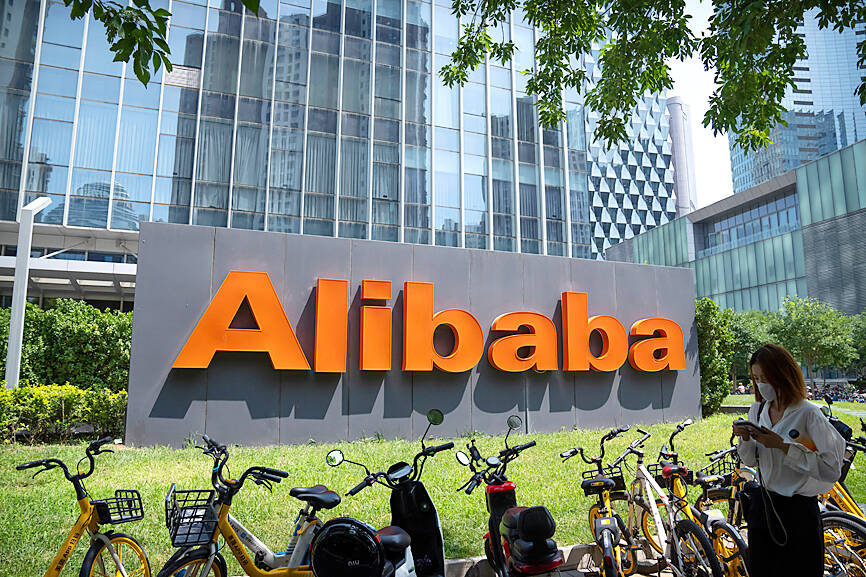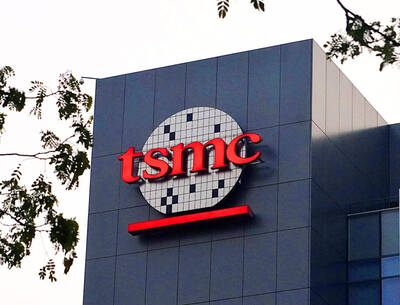The US Department of Defense concluded that Alibaba Group Holding Ltd (阿里巴巴), Baidu Inc (百度) and BYD Co (比亞迪) should be added to a list of companies that aid the Chinese military, according to a letter to the US Congress sent about three weeks before US President Donald Trump and Chinese President Xi Jinping (習近平) agreed to a broad trade truce.
US Deputy Secretary of Defense Stephen Feinberg informed lawmakers of the conclusion in the Oct. 7 letter, a copy of which was seen by Bloomberg News, to the heads of the US House and Senate Armed Services Committees.
It was not clear whether the companies have been formally included in the Pentagon’s so-called 1260H list, which carries no direct legal repercussions, but serves as a major warning to US investors.

Photo: AP
Feinberg said the three companies, along with five others — Eoptolink Technology Inc (新易盛通信技術), Hua Hong Semiconductor Ltd (華虹半導體), RoboSense Technology Co (速騰聚創科技), WuXi AppTec Co (無錫藥明康德) and Zhongji Innolight Co (中際旭創) — merit inclusion on the 1260H list, which identifies businesses connected to the Chinese military operating in the US.
The list is published annually, and the most recent version, which was updated in January before Trump took office, does not include them.
“In our review of the latest information available, the Department has identified eight entities that it has determined are ‘Chinese military companies’ in accordance with the statute that should be added to the 1260H list,” Feinberg wrote in the letter.
Inclusion on the list could amount to a serious challenge for Alibaba, which is stepping up efforts to compete globally in artificial intelligence (AI), as well as the other firms.
In a statement, Alibaba said there was “no basis” for its inclusion on the list.
“Alibaba is not a Chinese military company nor part of any military-civil fusion strategy,” the company said. “We further note that, because Alibaba does not do business related to US military procurement, being on the Section 1260H List would not affect our ability to conduct business as usual in the United States or anywhere in the world.”
Baidu said that its products were designed for civilian use.
“There is no credible basis for adding Baidu to the 1260H list or any other US government list of restricted companies,” it said in a statement. “The suggestion that Baidu has military connections is entirely baseless and no evidence has been produced that would prove otherwise.”
Representatives for the other Chinese companies named in the letter did not immediately respond to requests for comment.
The list, first published in 2021, now includes more than 130 entities accused of working with the Chinese military. The names include those of airlines, construction companies, shipping companies, computer hardware manufacturers and communications companies.
Analysis by the law firm Hogan Lovells said inclusion on the 1260H List has “several direct and indirect implications,” including restrictions on US defense contracts, potential inclusion on other restricted party lists, reputational damage and increased compliance costs.

Shiina Ito has had fewer Chinese customers at her Tokyo jewelry shop since Beijing issued a travel warning in the wake of a diplomatic spat, but she said she was not concerned. A souring of Tokyo-Beijing relations this month, following remarks by Japanese Prime Minister Sanae Takaichi about Taiwan, has fueled concerns about the impact on the ritzy boutiques, noodle joints and hotels where holidaymakers spend their cash. However, businesses in Tokyo largely shrugged off any anxiety. “Since there are fewer Chinese customers, it’s become a bit easier for Japanese shoppers to visit, so our sales haven’t really dropped,” Ito

Taiwan Semiconductor Manufacturing Co (TSMC) Chairman C.C. Wei (魏哲家) and the company’s former chairman, Mark Liu (劉德音), both received the Robert N. Noyce Award -- the semiconductor industry’s highest honor -- in San Jose, California, on Thursday (local time). Speaking at the award event, Liu, who retired last year, expressed gratitude to his wife, his dissertation advisor at the University of California, Berkeley, his supervisors at AT&T Bell Laboratories -- where he worked on optical fiber communication systems before joining TSMC, TSMC partners, and industry colleagues. Liu said that working alongside TSMC

ALLEGATION: When he retired from TSMC in Juiy, former executive vice president Lo Wei-jen did not reveal plans to join competitor Intel, TSMC said Taiwan Semiconductor Manufacturing Co (TSMC, 台積電) yesterday said it had filed a lawsuit against former executive vice president Lo Wei-jen (羅唯仁) claiming he contravened the terms of his employment, amid suspicion that Lo stole TSMC’s trade secrets and leaked them to its US competitor, Intel Corp. In a statement, TSMC said it had filed a suit against Lo at the Intellectual Property and Commercial Court, citing contraventions of the Trade Secrets Act (營業秘密法), the terms of his employment, and confidentiality and noncompete agreements he had signed. The company said it hired Lo as vice president in 2004, and he was

TECHNOLOGY DAY: The Taiwanese firm is also setting up a joint venture with Alphabet Inc on robots and plans to establish a firm in Japan to produce Model A EVs Manufacturing giant Hon Hai Precision Industry Co (鴻海精密) yesterday announced a collaboration with ChatGPT developer OpenAI to build next-generation artificial intelligence (AI) infrastructure and strengthen its local supply chain in the US to accelerate the deployment of advanced AI systems. Building such an infrastructure in the US is crucial for strengthening local supply chains and supporting the US in maintaining its leading position in the AI domain, Hon Hai said in a statement. Through the collaboration, OpenAI would share its insights into emerging hardware needs in the AI industry with Hon Hai to support the company’s design and development work, as well